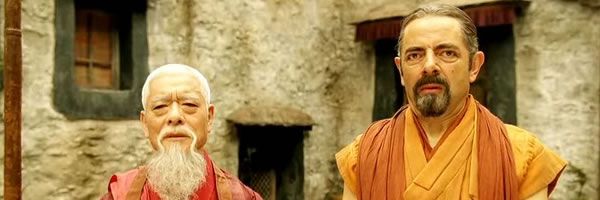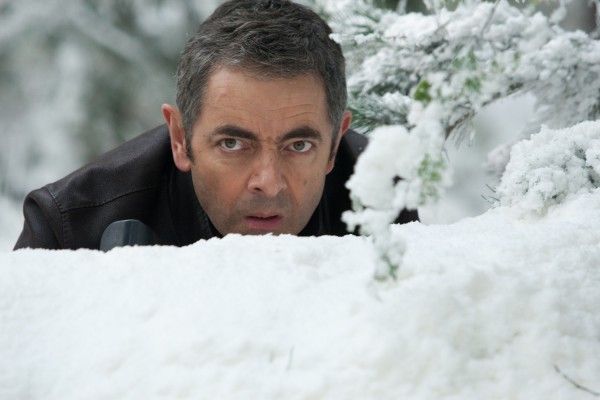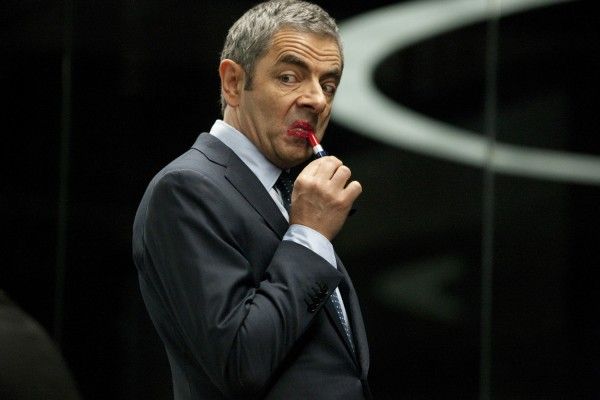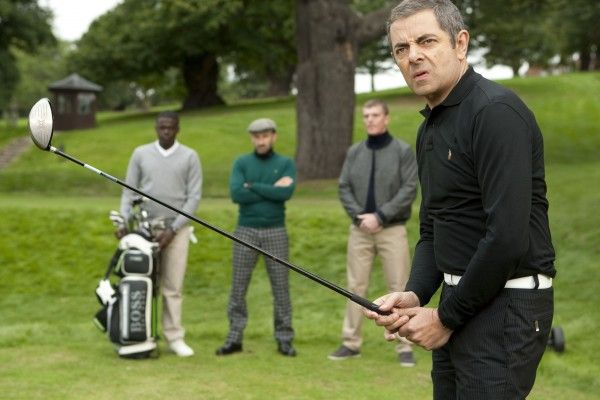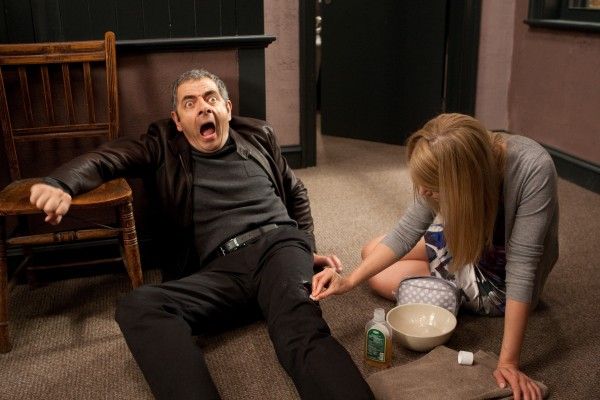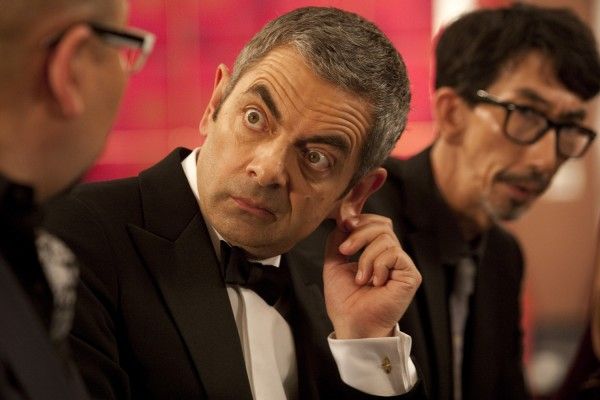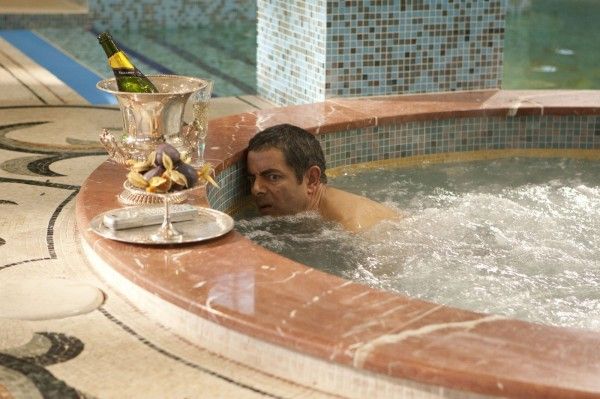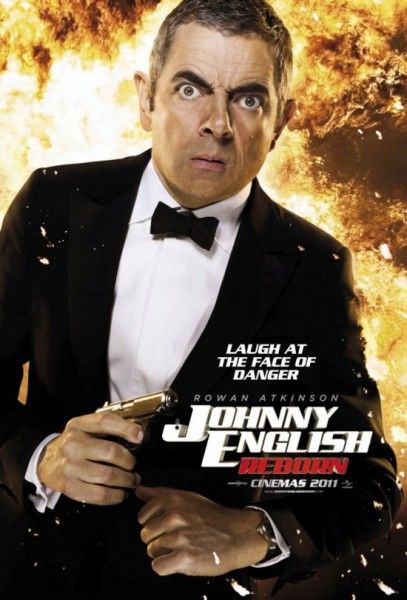Eight years ago, the world’s favorite secret agent, Johnny English (Rowan Atkinson), retreated to a Tibetan monastery to hide from a disastrous mission. Now, MI7 is calling him back into action, for a mission that only he can handle, and this latest adventure includes stopping a group of international assassins before they eliminate a world leader and cause global chaos. Part delightful comedy, part action-thriller, Johnny English Reborn has laughs, stunts and a love story, all of which will have you rooting for the highly unorthodox agent.
At the film’s press day, British actor Rowan Atkinson talked about how much fun he had returning to the character of Johnny English, what it is about his brand and style of humor that transcends cultures, the experience of shooting in Hong Kong, and the decision to add an extra scene during the film’s credits. Check out what he had to say after the jump:
Question: How fun was it to get back into this character? When you’re playing Johnny English, do you get a sense of what it’s like to be a spy?
ROWAN ATKINSON: Yeah, I think you’re bound to get a sense of any character that you play. It’s not something you often do in comedy. Generally speaking, usually one’s characterizations or the situations that you’re presented with are fairly silly or shallow or fun. If you’re a serious actor, it’s when you know you’re going to die tomorrow that you really start to feel it.
I remember that I did a situation comedy in Britain, for the BBC, called The Black Adder, and the fourth series of that was set in the trenches in France, in the first World War. That’s a pretty unfunny environment, by any measure, but it was actually a surprisingly good context with which to set a sitcom because it meant that almost any joke stood out in sharp contrast to the tragic context in which it was set. In the very final episode, at the end of it, we had to go over the top, and leave our trench and go out into no man’s land and tackle the German enemy. The belief was that you were going to die because the number of casualties that was suffered, every time a platoon or squad went over the top, was so high. There was that strange feeling, as we were rehearsing for the five days before we shot the episode in the studio on the sixth day, in the pit of your stomach, that you were going to die, at the end of the recording session. It was something that I had never experienced before because it was a very unusual comic situation, in which I found myself.
I’m not sure why I started talking about that, but I think all I’m saying is that you’re bound to feel the dilemma of the character that you play. That’s a rather extreme example of it, but if you don’t feel it, then you’re probably not acting the part as well as you might. Johnny English is an enjoyable character to play. He’s fun and he’s rather human. I think he’s a rather realistic character. Perhaps he’s a more realistic and believable character than James Bond, in many ways. James Bond is just a superman. It’s rather fun to play someone with more faults and foibles.
What do you think it is about your brand and style of humor that transcends different cultures?
ATKINSON: I’m very dependent on places like Hong Kong and the Far East and Europe, where thankfully the film has done well, so far. Mr. Bean has established me and my reputation in those territories. He’s a relatively easy sell on the international stage because he doesn’t say much. There’s very little verbal dimension to what he says and does. Johnny English is a little more complicated because he’s a bit more verbal, but there’s still very strong visual elements to him. And, I think the tone of the comedy is very similar. It’s very simple and very accessible comedy. I’m afraid it’s not very sophisticated. Occasionally, it’s slightly sophisticated, but not very. And, of course, it’s clean. It’s a family comedy. Johnny English movies are that relatively rare thing, where they are family comedies that aren’t animated. In this day and age, there aren’t many of those. So much comedy, in the last five to eight years, has been far more adult, in the American Pie and The Hangover tradition. We’re definitely not in that tradition.
What was it like to shoot in Hong Kong?
ATKINSON: It was great. I hadn’t been there since 1987, when it was still a British colony. The atmosphere had changed somewhat. It was a slightly less interesting place, in many ways. It felt a little more sanitized and cleaned up. There was a lot more contrast, between rich and poor, in the old days. There’s less of that now. It’s like a huge shopping mall, actually. That’s why all the Chinese come over from the mainland, and not everyone is allowed over. Only certain people are allowed over, from what I gather. Even though it’s part of China, you’re not allowed in there unless you fulfill whatever the requirements are. But, it’s a great place with such an interesting history.
What was it like to work with Daniel Kaluuya and develop the dynamic between your characters? What was it about his humor as Tucker that was the perfect complement to yours?
ATKINSON: The sidekick is a very difficult role to play. It’s not an enviable role, and yet it’s terribly important. The role of straight man, in many ways, is as difficult, if not more difficult than the role of funny man because it’s a matter of dancing around a situation. Danny has got to make Tucker’s relationship with Johnny believable, and yet he’s got to have a character of his own. He can’t just be a sap or a yes man. He’s got to have a personality of his own, which Daniel has, in spades, luckily.
We auditioned 40 or 50, 20-something, male actors for the part, and he literally was the only one who was absolutely right. He’s got a fantastic face. He, himself, is naturally very funny and very able, but also tremendously empathetic. My only regret about Daniel was that we didn’t do more with him. Particularly at the beginning, I don’t think his character is well introduced. It’s a little bit brief. There were a couple of scenes, at the beginning of Hong Kong, that were cut for the usual reasons. The movie just felt too long, and the Hong Kong section felt too long. The regret was that it meant that Daniel didn’t get off to as strong a start as I feel he would have done, if we had those scenes in. But, by the end of the movie, I think he establishes himself extremely well, and that was gratifying.
What made you decide to include a scene at the end of the film, during the credits, where you’re cooking up a culinary masterpiece?
ATKINSON: I don’t know where it came from, except that I’d thought of it as a Mr. Bean sketch, many years ago, and it seemed to adapt quite well to Johnny English. It’s basically making a lamb casserole in two minutes and 12 seconds. For some reason, it had always been in my head. I don’t know where it came from or what the inspiration was. But, it was in the body of the movie. It was in the scene in Kate’s (Rosamund Pike) flat in the film, but it was irrelevant to the plot. It’s a complete branch line that had nothing to do with the progress of the story. Just before your Act 3 in your story, we felt that it was a risky place to have a scene that had no relevance to anything, even if it was funny and fun to watch. It was always a popular scene, so we thought of just putting it as a DVD extra, which it will be, but we actually liked it enough to just stick it on the end of the credits, even though not many people will see it because it’s quite a long way down the credits. I think most people will have left the theater. But, it’s a fun thing.
Are you funny, in real life?
ATKINSON: No, I’m not a naturally funny man. I find that I can only be funny, if I become someone else. That’s what I need to do. I need to act a part, and then I can be funny. I can be reasonably funny and light-hearted when I’m in the company of good friends, but I’m not a jokesmith. I tend to be quite serious.
What was it like to work with Gillian Anderson (who plays the head of MI7), and what did you make of her British accent?
ATKINSON: We didn’t think of her as being not particularly English. She was born in the States, and then moved to Britain, as a child. She’s got a very good English accent, and she does a very good American accent as well. We went to Australia for the premiere there, and when she was talking to Australians or Americans, she was talking to them in an American accent, and when she was talking to English journalists, she was talking to them in an English accent. It was quite extraordinary how she entirely unconsciously tended to adapt. I think we all tend to do that, a tiny bit, to adapt our way of speaking to those with whom we’re speaking. But, it was great to have her. She was very good and very strong.
One of the reasons why we wanted to cast her was because she’s a very strong, but also very attractive woman. Like Dominic West and Rosamund Pike, her challenge was the challenge of any serious, proper actor, coming into a comedy movie. How much are they lent on to provide the comedy? It’s sometimes very difficult to know. They don’t know if they’re supposed to be funny, if they’re supposed to be obviously funny, or if their lines are funny or not. They look straight and serious, as they read them. You’ve just got to convince them that, even though it is a comedy, we hope it’s a truthful character story comedy. It’s not where you have to lark about. What larking about there is, you can leave to me.
All they had to do was play the part straight and serious, but also fit into the story. They couldn’t appear to be too detached from Johnny English, and pretend he’s not there or pretend that he’s not doing what he’s doing. They had to find their own reality, and they all did it extremely well, in the end, simply by playing it very straight. One of our ambitions was to cast the movie, as if we were casting a James Bond movie, and I think all those people would do extremely well in a James Bond movie, along with Rosamund, who was cast in a James Bond movie. I always believe that the more serious and believable our British secret service world is, the funnier Johnny English’s mistakes would appear in contrast.
What was Oliver Parker like to work with, as a director? Did you improvise a lot, during filming?
ATKINSON: There was very little improvisation, on the floor of the studio. There was improvisation in the writing meetings. Most of the writing took place in a room with myself, the writer and Oliver Parker. The three of us just threw around ideas and said, “Wouldn’t it be funny if this happened? Wouldn’t it be funny if that happened?,” and then deciding on the funniest bits and trying to put them into a story. Sometimes you started with the story, and tried to find some funny bits to go with the story. But, on the studio floor, there was not much improvisation there.
Obviously, you’ve got to work things out, like the chair scene, in which the chair is going up and down, in the scene with the Prime Minister. We knew roughly that it was a serious scene with serious dialogue, and Johnny English has a problem with a pneumatic chair. That was all we knew that the scene was. We had to actually be shooting it to work out the timing of the chair, and how fast it would go up and down. Those basic decisions you can only do when you’ve got the actual appliance in your hand and you’re actually shooting it. Only then, can you properly work it out.
Oliver was fantastically patient and brilliant as a director, in my opinion, because he was so tolerant of me and my peccadillos, the worst one being never really being happy with what I do. Whenever I did anything, I always wanted another take. I wasn’t sure whether it was good enough. It’s very difficult for a director who can see when something is working well, and the actor just says, “That went well, but not as well as I think it could.” He was very patient of that particular challenge.
How often did everybody crack up on set?
ATKINSON: I don’t have any trouble with that at all, sadly. Whenever they’re trying to produce a bloopers reel from movies that I’m involved with, they have a lot of difficulty because I never really laugh at anything on set. I’m like that, I’m afraid. There are some. They have managed to scrape together a few slightly light-hearted moments for the bloopers reel, which will be on the DVD. But, others crack up. The other actors in the chair scene were laughing quite a lot. Sometimes I couldn’t understand what they were laughing at, and then I realized that they were just laughing at what I was doing. There’s not much of that for me.

